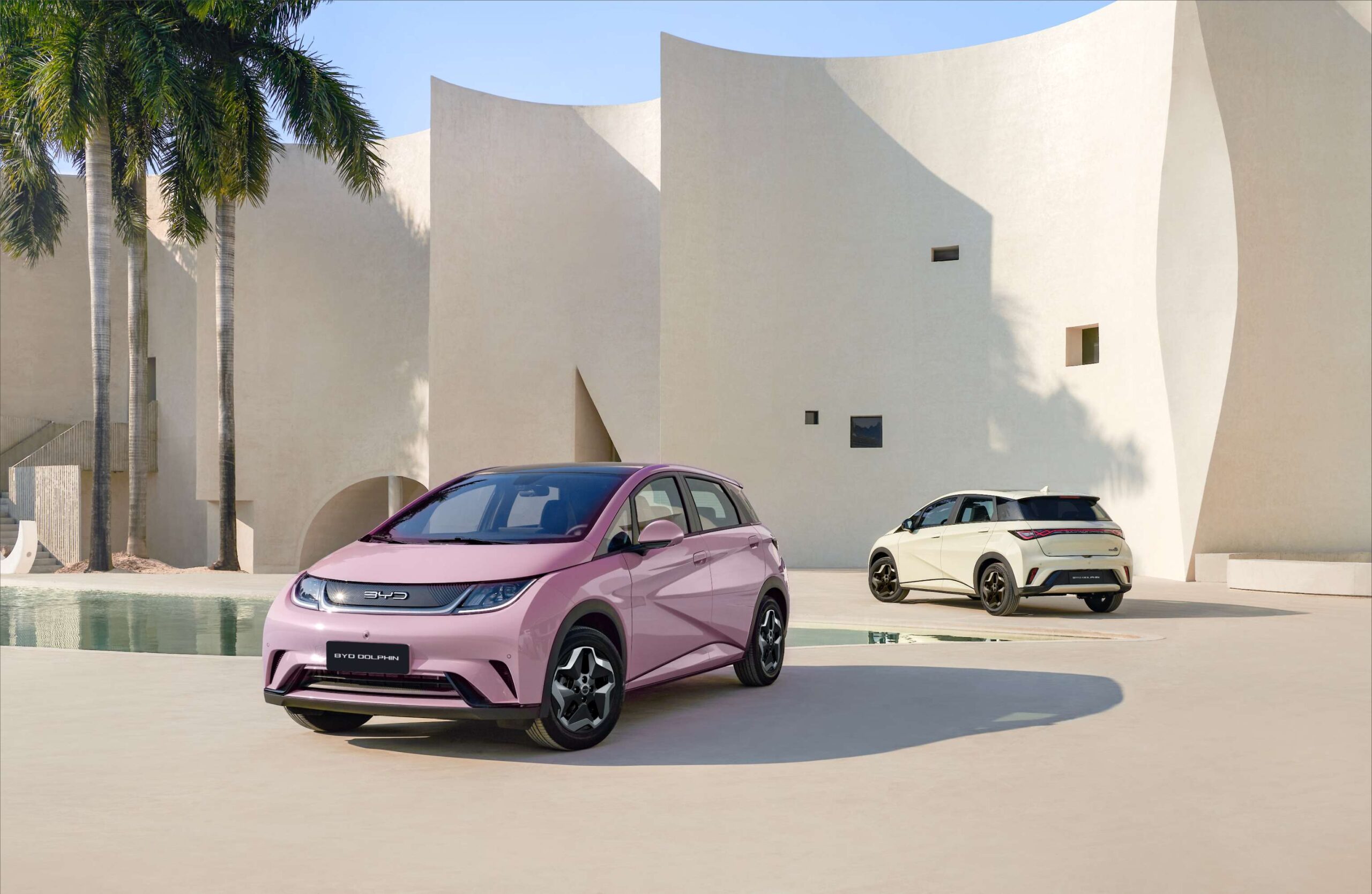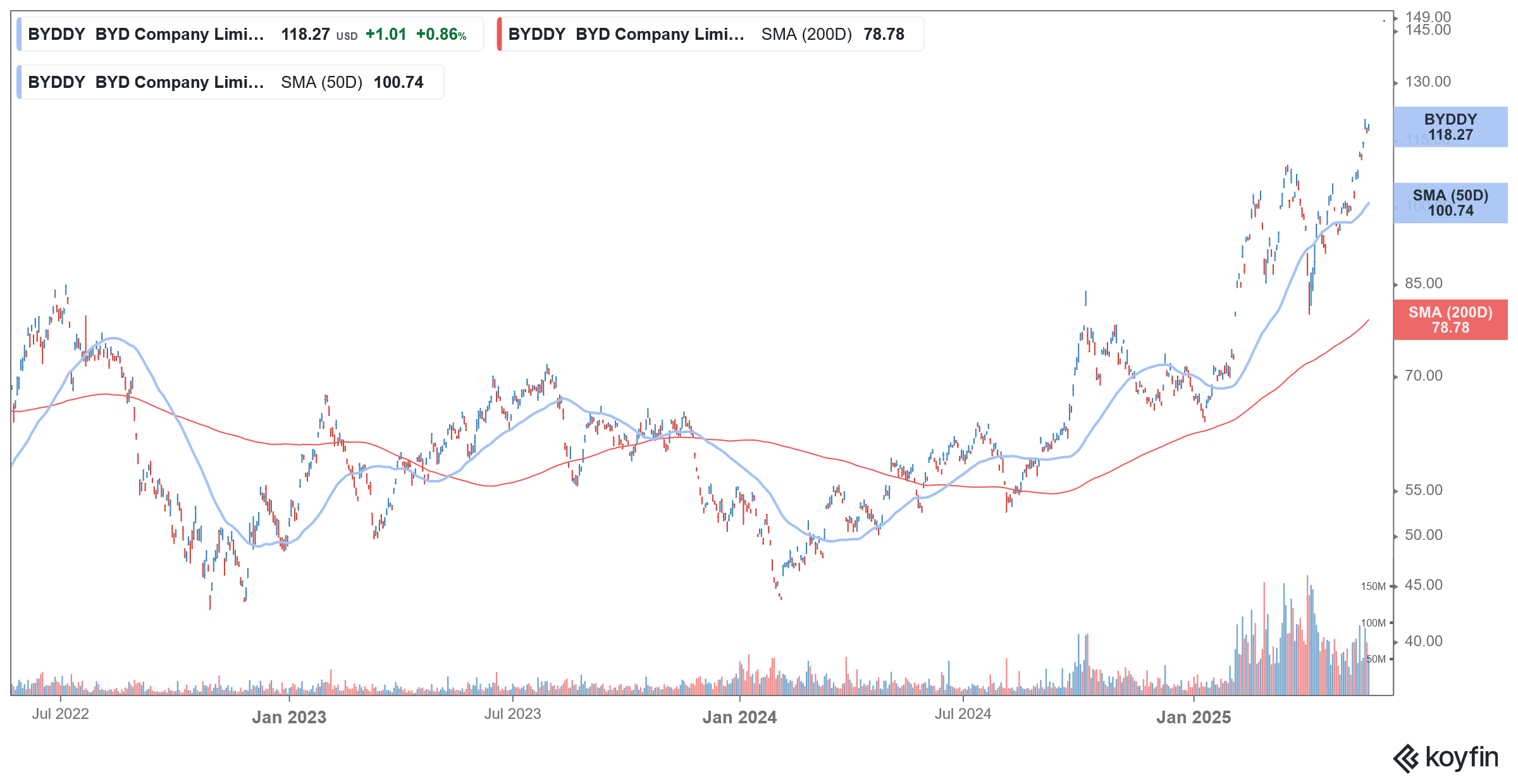
The electric vehicle (EV) price war in China is set to escalate further after market leader BYD slashed prices for its vehicles. Chinese EV shares including BYD are trading lower today amid fears of margin pressure due to price cuts.
BYD announced that it is cutting prices on 22 of its models until the end of this quarter. These include both battery electric vehicles (BEVs) and plug-in hybrids (PHEVs). The price cuts are quite aggressive, and the company slashed the price of its Seagull hatchback by 20%. The model, which is the cheapest from BYD, would now cost just about 55,800 yuan (around $7,780). The biggest cut was for the Seal dual-motor hybrid sedan, whose price has been slashed by 34%.
BYD cuts vehicle prices
BYD’s price cuts are yet another salvo in the price war in the world’s biggest market for new energy vehicles – a category that includes both PHEVs and BEVs. Citi analysts expect that the price cuts caused an increase in footfall by between 30%-40% at BYD’s dealerships this weekend, compared to the previous one. The brokerage, meanwhile, expects other Chinese automakers to also announce price cuts and said, “We anticipate peers to follow BYD’s price cut.”
Commenting on BYD’s price cuts, Morgan Stanley analysts, including Tim Hsiao, said, “While some of these discounts have been in place since April, the official announcement sends a strong signal of how tough the end market is.”
Notably, while China is home to around 4 dozen EV companies, only a few a posting a profit, and the price war would only aggravate the situation. “Fierce as the competition turns out to be, we still see some bellwether companies wading through the turbulence to make profits,” said Nick Lai, head of Asia-Pacific auto research at JPMorgan.
He added, “Indeed, some carmakers rely on overseas sales to make money since they enjoy higher profit margins abroad.”
China’s EV price war
Notably, there has been a brutal price war in the Chinese EV industry since Q4 of 2022 when Tesla started to cut car prices to spur sales.
Tesla’s price cuts were followed by similar announcements from other carmakers, including Xpeng Motors, Ford, Toyota, and Nissan. In 2023, even NIO lowered car prices. Previously, the company had categorically said that it wouldn’t join the price war.
The China Association of Auto Manufacturers (CAAM) tried to bring about a truce in the price war in 2023, but that effort failed.
A total of 16 automakers including Tesla (which was the only foreign automaker in the lot) signed the pledge at an industry conference in Shanghai which stated they “take on the heavy responsibility of maintaining steady growth, strengthening confidence and preventing risks.”
However, the truce failed, and shortly, CAAM retracted the pledge and said that the EV price war agreement violated China’s antitrust law.
BYD has been reporting stellar growth in deliveries
In April, BYD sold 380,089 NEVs. The company’s BEV deliveries rose 45.6% YoY to 195,740, while PHEV sales fell 0.4% over the period to 176,875. After a gap of many months, BYD’s BEV deliveries were ahead of hybrid sales. BYD sold more EVs than Tesla in Q1 and looks set to grab the title of the world’s biggest EV seller in 2025. Notably, BYD’s 2024 revenues were ahead of Tesla as it reached the milestone of hitting $100 billion in revenues.
While BYD’s shipments have soared in 2025, Tesla’s EV deliveries fell 13% YoY in Q1. The company’s revenues fell 9% in Q1, and it missed estimates for both the topline and bottomline.
Meanwhile, BYD sold 79,086 vehicles in international markets in April, which marks record deliveries for a fifth straight month. While several countries, especially the EU, have clamped down on EV imports from China to protect their domestic industries, Chinese EV companies haven’t pared back their ambitions and continue to target export markets aggressively.
BYD outsold Tesla in Europe last month
Last month, BYD sold more BEVs than Tesla in Europe. While the Elon Musk-run company has been in Europe for quite some time now and also has one of its Gigafactories in Berlin, BYD entered the region only in late 2022. Moreover, BYD cars face tariffs in the EU, while the cars built by Tesla at its Germany Gigafactory are exempt from these tariffs.
Despite having an advantage over BYD, Tesla was outsold by BYD last month. This is predominantly due to the cheap price at which BYD sells its cars.
Musk has praised Chinese EV companies
Tesla CEO Elon Musk has been all praise for Chinese EV companies and the country’s EV ecosystem. During Tesla’s Q4 2023 earnings call last year he said, “Frankly, I think, if there are not trade barriers established, they will pretty much demolish most other companies in the world.”
He added, “The Chinese car companies are the most competitive car companies in the world. So, I think they will have significant success outside of China depending on what kind of tariffs or trade barriers are established.” Incidentally, BYD surpassed Tesla’s annual revenues last year and is on track to become the biggest BEV seller in 2025 after grabbing the title in Q1 from Tesla.
Ford CEO Jim Farley has also praised Chinese EV companies. Notably, Ford has slowed down its ambitious pivot to build electric cars and is instead doubling down on hybrids.
BYD announced new charging technology in March
In March, BYD unveiled its “Super e-Platform” technology, which is capable of peak charging speeds of 1,000 kilowatts and will allow cars to achieve a range of 400 kilometers in only 5 minutes.
Fast charging, access to more charging stations, and a higher range are among the factors that can boost EV adoption and get more fence-sitters into buying an electric car. Importantly, a battery is the most important hardware component of an EV and is the costliest as well.
Earlier this year, BYD released an assisted driving system named “DiPilot” in partnership with DeepSeek. The Chinese AI (artificial intelligence) startup created waves with its low-cost AI model, which performed better than models from OpenAI and Meta Platforms on some parameters. BYD would offer assisted driving for free and would become the only automaker offering these features in cars priced below $10,000.
While one may argue that players like Tesla and Xpeng Motors offer a more advanced version of autonomous driving, BYD offering assisted driving for free has raised fears about other companies’ ability to charge premium pricing for their self-driving features.


Question & Answers (0)